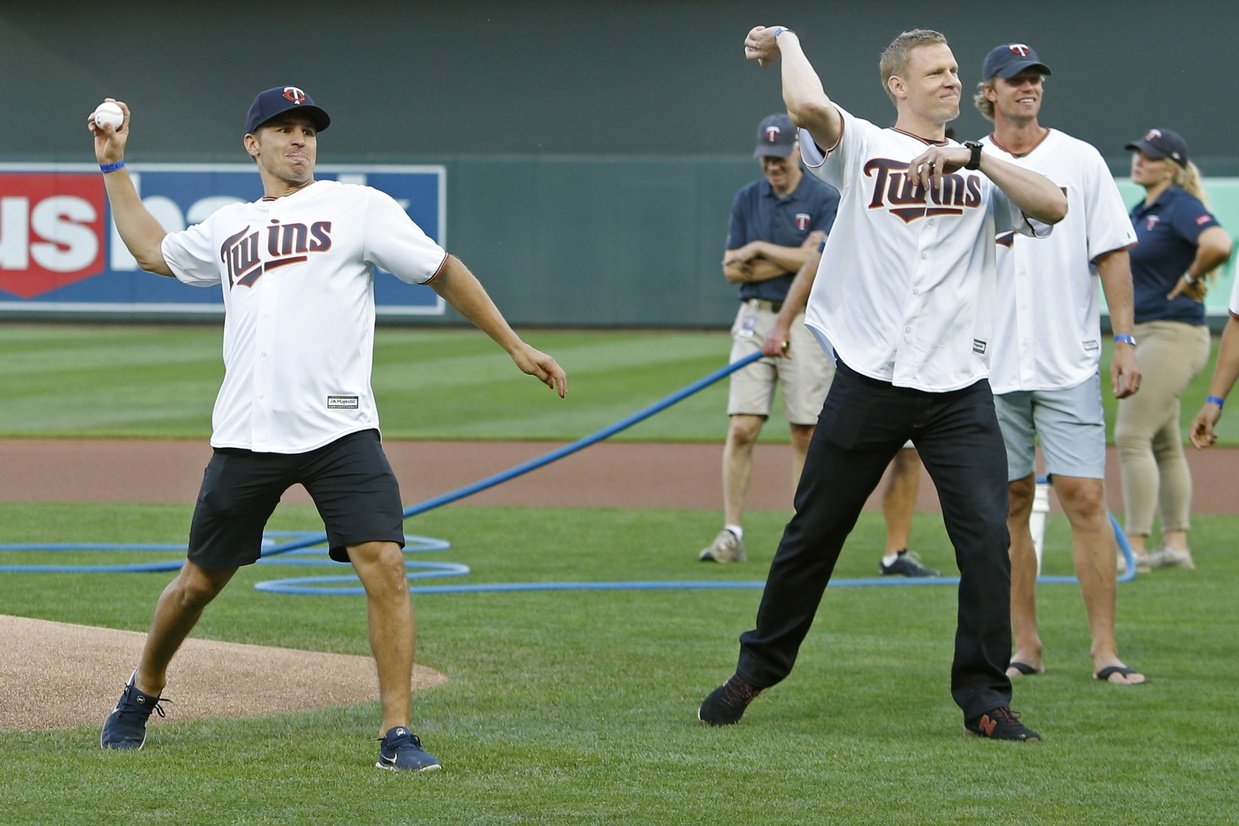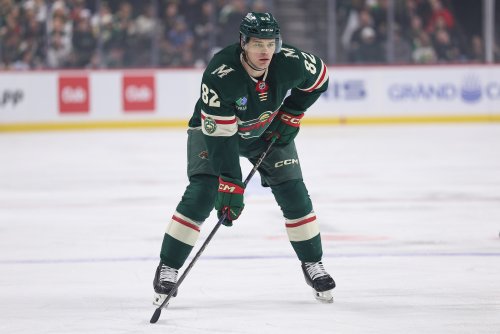
Mikko Koivu and Joe Mauer were born 38 days apart, on opposite sides of the Atlantic Ocean. Neither of them knew it, but they were destined to mirror each other. Yes, Koivu played hockey in St. Paul for the Minnesota Wild, while Mauer played baseball in Minneapolis for the Twins. But other than that, they might as well have been the same person.
Both were highly-touted prospects that were drafted high in 2001, Mauer first overall and Koivu sixth. They each spent 15 seasons in their teams’ respective uniforms, becoming the faces of their respective franchises. And despite playing at a high level, they both had mixed receptions with fans and media alike.
Mauer ended his run with the Twins back in 2018. And it looks like Koivu’s time with the Wild is (all but) officially done as well. The Athletic’s Michael Russo reported Wednesday that Koivu has likely been told that the Wild will move on from him. It is uncertain whether he’ll play in the NHL again.
With the book closed on their twin legacies, let’s look back at their parallel careers and ask whether they’ll be remembered in a more favorable light with time.
Analytics Darlings in a Non-Analytics World
Mauer and Koivu each came onto the scene at roughly the same time, playing their first full seasons in Minnesota at age 22. That season was a year to get acclimated to their respective leagues, and once they were established, both took off.
Mauer won his first batting title at age 23, the first by a catcher in American League history. He would then go on to win two more batting titles, while making the All-Star Game six times to go with three top-10 MVP finishes. And of course, he won MVP in 2009 when he hit an absurd .365 while smacking 28 home runs.
Koivu may not have hit the MVP-level heights Mauer did, but Koivu was still an impact player. He finished his age-23 season with 20 goals and 54 points. The next season, he put up 42 points in 57 games while playing almost 21 minutes a night. From ages 23 to 33, Koivu provided superb defense at center while averaging 60 points per 82 games.
They were both ahead of their times, excelling at aspects of the game that wouldn’t be appreciated until later in their career.
Mauer came into baseball just as sabermetrics were becoming mainstream. Fans may take the value of on-base percentage for granted now, but in 2006 batting average, home runs and RBI still ruled the day. And as a hitter, Mauer was one-for-three, boasting limited power.
In 2020, Mauer would be an ideal No. 2 hitter, or even a leadoff man with his on-base skills. Instead, he was miscast in the three-spot, often with a light-hitting second baseman hitting in front of him.
As for Koivu, his bread-and-butter was skater defense. Hockey evaluation has always valued defense, but for most of Koivu’s career, most analysts relied solely on the eye test to measure defense. This is fine when you’re Pavel Datsyuk or Patrice Bergeron: Elite defenders on teams mainstream media pays attention to. But as a player for the consensus Most Boring Team in the NHL, Koivu got lost in the shuffle.
But Koivu’s defense wasn’t just elite. There’s a very good case to be made that he is the best defensive forward of the analytics era (2007-now). Since 2007, Koivu’s even-strength defense has been worth 56.3 Goals Above Replacement. For some context, David Backes is seventh on that list, with less than half the defensive impact (28.1 GAR). That’s dominance.
Koivu’s contributions were never recognized, though, as he never won a Selke Trophy (for best defensive forward). He only finished as a finalist in one season, 2016-17, as hockey analytics finally started making headway among awards voters.
Choosing to Stay
Another thing that links these two players is their loyalty. Both Mauer and Koivu had chances to bolt for greener pastures, but both made commitments to Minnesota when others bolted.
After Mauer’s MVP season in 2009, he was one year away from unrestricted free agency. Had Mauer wanted to go to a team that could offer him more money, or had more resources with which to compete, he could have notified the Twins of this and forced a trade. A similar thing happened with Johan Santana two years earlier.
Instead, Mauer committed to staying in the Twin Cities, inking a massive eight-year, $184 million deal that was still less than he could have commanded on the open market.
Koivu had even more reason to want out of the Wild back in 2010. The State of Hockey was reeling after the departure of Marian Gaborik. Koivu was coming off 42 goals and 138 points over the previous two seasons, but the Wild missed the postseason twice. Brent Burns would be on the move a year later.
Yet, Koivu stayed on to captain the Wild into an uncertain future, signing a seven-year deal. Yes, he got amply paid at $6.75 million per season. But like with Mauer, Koivu would have likely gotten that money as a free agent. He was a 60-point center with a terrific, if underrated, defensive reputation who would have hit free agency as a 28 year old. That kind of player tends to be in-demand.
Both had chances to force their way out. Instead, they’ll be remembered as among the best to play their whole career in Minnesota.
Twin Legacies
A less fortunate parallel between Mauer and Koivu is neither had much playoff success. And as the most high-profile members of their franchises, both took the brunt of criticism from fans and media for their teams falling short of expectations.
Mauer has the displeasure of never being on the winning side of a playoff game, going winless in 10 tries. In that time, he hit just .275 (.641 OPS) with zero home runs. A small sample size, but still unimpressive. Koivu had slightly more success, winning two playoff series in nine years, but still has a bad 18-41 record in the playoffs. Koivu’s playoff point production dipped to under a half-point per game.
Other things factored into their criticism. To many, their weaknesses (Mauer’s lack of power, Koivu’s lack of goal-scoring prowess) outweighed their strengths. Both Mauer and Koivu’s contracts were seen as an obstacle for their teams to acquire a better supporting cast. Their bland, stoic personalities didn’t endear them to fans or media types in the way, say, a Michael Cuddyer or Zach Parise did.
It’s understandable to get caught up in the moment when a team disappoints on an annual basis. But will the legacies of Koivu and Mauer be tainted forever by those playoff failures?
If the first two seasons of Mauer’s retirement is any indication, Mauer will be fondly remembered by Twins fans as an all-time team great. Mauer had a storybook ending for the Twins, batting .379 over his final seven games, all at Target Field. He smacked a double in his final plate appearance and went out with a memorable ovation when he suited up in his catcher’s gear for the first time in five years.
Since then, Mauer’s had his number retired at Target Field, cementing his place among all-time greats such as Harmon Killebrew and Tony Oliva. No one from his era has had that honor -- not Santana, not Justin Morneau or Torii Hunter. Mauer stands alone, and almost no one questions his place in Twins history.
Will that happen with Koivu? Koivu didn’t get the type of ending Mauer enjoyed. For one, the coronavirus pause meant that Koivu’s final season ended abruptly in March, denying his potential farewell tour. He went pointless in four playoff games, with no fans in attendance.
Koivu still got a big moment to shine this year, however. In his 1000th game, Koivu got the call to break the deadlock in a shootout. He scored using the backhand move that made him so dangerous in the shootout his entire career, winning the game for Minnesota. For a moment, it didn’t matter what he couldn’t do. His playoff shortcomings were a distant memory. All that mattered was that the best player in franchise history won them a game.
Will that goodwill be there when Koivu’s number gets raised to the rafters of the Xcel Energy Center in the near future? It should be. Koivu and Mauer may not have been players that single-handedly brought their teams a championship. That shouldn’t be the standard for why we honor a player.
There’s no reason to look back on Koivu’s career with anything but fondness for his quiet excellence, the pride he took in his defensive game and his fiery competitiveness. He should be remembered for willing himself to a 71-point season in 2009-10, when his wingers were Antti Miettinen and an ancient Andrew Brunette. Or his 2016-17 season, where he was the anchor for the best line in hockey alongside Mikael Granlund and Jason Zucker.
When the time came to honor Mauer’s accomplishments, Twins Territory gave Mauer a good and proper send-off. Let’s hope that when the time comes for Koivu to do the same, the State of Hockey rises to the occasion.
*All hockey stats from Evolving Hockey, all baseball stats from Baseball-Reference.
Think you could write a story like this? Hockey Wilderness wants you to develop your voice, find an audience, and we'll pay you to do it. Just fill out this form.






Recommended Comments
There are no comments to display.
Join the conversation
You can post now and register later. If you have an account, sign in now to post with your account.
Note: Your post will require moderator approval before it will be visible.